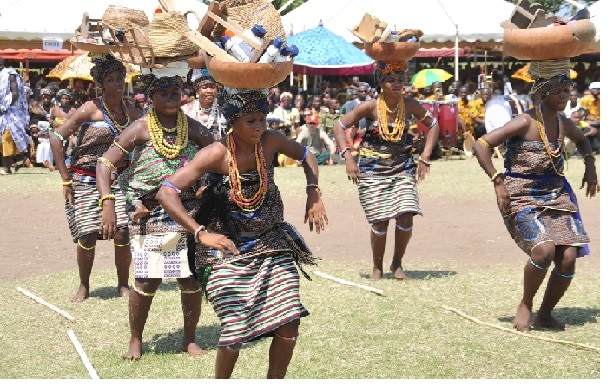Music and dance are common forms of entertainment in Ghana. There are varied types of music and dances in Ghana that are played based on seasons and ceremonies. There are four main types of music in Ghana: Traditional music, imported music, contemporary, and gospel music.
Traditional Music
Traditional Music involves drumming, singing, dancing, and clapping, which is common in festivals, ceremonies, funerals, weddings, and other public events. Ghana does not have a uniform style of presenting their songs; string instruments and calabash is dominant in the northern region, while drums are common in the southern area. Traditional music serves as a social ritual that tells a story of an event of historical importance to a particular community, especially when performed in festivals and ceremonies. Various local artists from each tribe mainly focus on traditional music.
Imported Music
Imported music comprises all western music, including hip-hop, American pop, dancehall, and reggae. Music from the neighboring countries is somehow popular in Ghana, particularly Afrobeat from Nigeria. This type of music is commonly listened to by people living in big cities and towns in Ghana. Jazz music is also commonly played in main big clubs and cities. A couple of communities living near the borders of Cote d’Ivoire and Burkina Faso listen to contemporary French music.
Reggae is one of the most popular imported music listened to by a large number of people in Ghana. Reggae parties are trendy in Ghanaian cities; for instance, some resort invites reggae artists to entertain their visitors every Saturday night. Dancehall music is among the newest imported music in Ghana performed by popular musicians like Stonebowy and Shatta Wale. Some artists compose their music by merging afrobeat, highlife, and Jamaican reggae.
Contemporary music
Ghanaian contemporary music involves hiplife, Afropop, Afro-jazz, and highlife styles. Hiplife is a current style of music that combines the highlife beat with inspirations from American Rap and Hip-Hop. It is typical for the young generation that hiplife is used to criticize bad behaviors happening in society. Highlife music was first recorded during the early 19th century but started being popular in the 1970s.
Gospel Music
Gospel music is mainly played to praise and Worship God, and it is mainly played in churches. It is a common type of music in Ghana.
Ghanaian Dances
Dances mainly accompany traditional music and are performed during celebrations, festivals, funerals, and other historical dates. The main dances in Ghana are;
Kpanlogo
It is a famous entertainment dance among the Ga-Adangbe community in Accra. It is performed with bent knees and back; it features sexually suggestive motions. The dance movement indicates various politics, expression of human feeling, and social problems.
Bamaya
Bamaya is a dance that marked the end of a great drought that occurred in the 19th century. This is a disgraceful display of gentlemen dressed as women in an honorable, beautiful, and thoroughly campy celebration. It is common among the Dagbamba tribe from northern Ghana.
Adzogbo
It was a war dance initially, but it is a social and recreational dance these days. This dance starts with kadodo and involves arms, taps, and hops movement from the leading foot. Women start the dance and are followed by men. The dance is common among the Ewe people in the Volta Region.
Borborbor
Borborbor is a tribal dance that involves females in colorful long dresses and two white handkerchiefs forming a circle and swaying to the rhythmic beats of the music. Performers spin the handkerchiefs in the air when doing this dance. The Ewe people in southern Togo perform it.
Kple
Kple is a dance used to communicate with the gods and to ask for a blessing. It is a regional dance originating from Accra city and is performed by pastors in churches during the Homowo festival.
Music and dance are commonly used to express the cultural beliefs of various communities.
